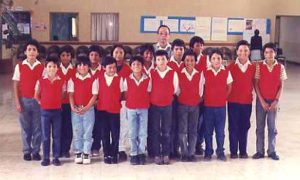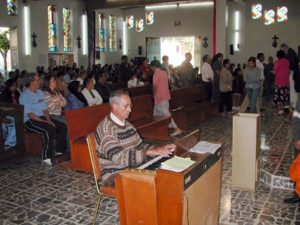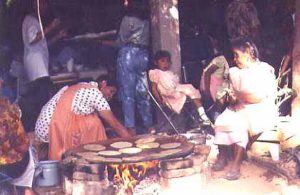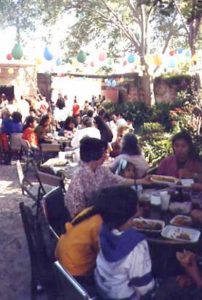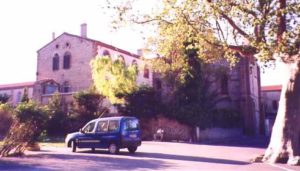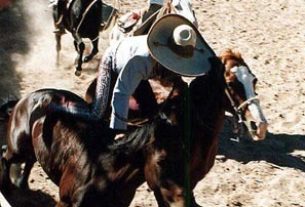Olvera has been teaching a choir in Santa Ana Tepetitlan, for boys aged six to 13 years old, five days a week for the last 23 years.
The first time I hear the choir Ninos Cantores de Santa Ana, led by Professor Jose Garcia Olvera, is at the Jocotepec church. They have been asked to sing at the Mass for the first Communion ceremony. The purity and strength of the boys’ voices fill the church. I make an appointment to speak with their teacher.
The café where we have agreed to meet is noisy with trucks so I invite Jose Garcia Olvera to my home, to hear what I think will be an account of his musical career. He was 83 years old in April. I am aware of his simplicity, his lack of pretense and of an aura of peace and authority about him.
“Where were you born, Professor?”
“I was born in Mexico City on April fourth, 1923. I was third in a family that was to grow to 16 children, eight boys and eight girls.”
“Were you born into a musical family?”
“My father had studied law but when my grandfather died he took over the family’s business, which was the maintenance and rental of houses that they owned in Mexico City. In the evenings my father played the piano and my mother sang. When I was five years old I was sent to live with my grandmother. My maiden aunt, who also lived with her, was a concert pianist. She taught piano and painting and she was my first teacher. Later, my two sisters and I undertook formal music lessons with my uncle, who was a professional musician. That was the beginning of my love of music.”
He went to the secundaria in Mexico City with los Hermanos Maristas (the Marist Catholic religious order). When the religious persecution started in Mexico, the Maristas had to close their schools. They bought an old convent in France and sent some Mexican boys to continue their religious education there. Olvera was 14 years old when the director asked him if he would like to be a Marist brother like them and he said yes. Three ship’s passages had been booked for France on a British ship, the Orinoco, that was to sail two weeks hence. He and two other students had been chosen to study at a Marist seminary in a small town in the south of France, three kilometers from Perpignan. A French priest, Marcellin Champagnat had founded the Marist order, originally known as les Petits Freres de Marie, to educate the children of small communities.
“My father was a Cristero. He held secret meetings at our house where people met to celebrate Mass. When the director came to talk to my parents my father said he could not oppose the vocation of his sons. It took longer for my mother to agree.”
“But at 14, did you not think that you would miss your family and your country?”
“As it turned out, one of the original students chosen could not go and my 11 year old brother, Francisco, took his place, so I had family with me, though at the seminary we were discouraged from speaking Spanish with one another.”
” Vous parlez francais?” I ask.
” Mais bien sur, mais ca fait 60 ans que je n’ai pas parle francais.”
It’s been 60 years since he last spoke French and here he is speaking it again with the sunny accent of the south of France.
Two weeks later they were on a train to Vera Cruz with a French teacher. There they boarded the ship with destination France. It was 1937. The voyage lasted 21 days.
“We took the train to Paris and from there another train southbound to the small town where the seminary was. I spent five peaceful years there absorbing the spiritual education to become a religious brother. I was very happy there. Music was part of the teaching and I used to play the organ during Mass to put in as much practice as I could.”
“How did you live the German Occupation of France?”
“We never saw the Germans. But the French generals found out that the seminary was an international school and not only for French students and half the building was appropriated to lodge French soldiers.”
In 1941, at 19, he boarded a Spanish ship back to Mexico while his brother stayed on another two years.
“The three vows of the order are poverty, chastity and obedience. We went where we were sent. My superiors arranged the passage home. Out of the 600 passengers, 300 were Jews on their way to New York.”
The Mexican State and the Church had come to an understanding and the colegios Maristas were re-opened. He was sent to teach in Guadalajara in a colegio religioso Marista where he lived in community with the brothers.
“After 21 years of teaching as a Marist brother, when I had just turned 40, I made an analysis of my life. I was working in schools for children of rich families. Where were the poor children who also needed education? I suggested to my superiors to open a school for the poor and was told that there were not enough teachers to go around. I proposed to stop working at the colegio and to open a school in Los Altos de Jalisco.”
He sought an audience with the cardinal, who agreed with him that there was a need for such a school. He told him to write to the Marist Superior General in France, who was a Mexican man he knew well, to seek permission to start a school for the poor.
His second in command wrote back: You have a wonderful vocation to help the poor but you will not be able to fulfill it with us. I am going to ask for your release from your vows and from the order so you can dedicate yourself to your vocation of building a school.
“I had taken a vow of obedience to the rules of the order, but now I found that my need to obey an inner calling was much stronger. I found myself with no money, no work and no lodging. I put myself under the orders of a holy priest, Jesus Moreno, even poorer than I was, in the small parish of Pegueros. There I forgot all about music. An elderly woman lent us a big house that she owned and that’s where we started. The priest, with many sacrifices, started building a school at the edge of town, with two albaniles (brick masons) When the first floor was finished, we moved to the new school.”
“We started with the first five grades. At the end of the year, I had two adolescent boys who wanted to help. I gave them classes at night so they could pass their teacher’s exams in Guadalajara. I had a friend there in an approved school, and she took my students in to take the exam. Everything got resolved along the way.”
Part of the reason they managed so well was that the Instituto Mexicano de Proteccion a la Infancia somehow heard about them and sent an inspector to see what they were doing. When he saw the school he asked them to make a list of the supplies they needed. The American organization CARE provided food for the children from the very beginning.
“We had 98 live-in boys. They came from families eking out a living in remote plots of land. We’d been in operation for thirteen years when a woman came. She had lost her husband and had been left with five children and no family to help her. I offered to take in her kids if she agreed to help out with the school. She was an extraordinary woman, a very hard worker. Her arrival started a very happy period of cleanliness and tasty food.”
“At the end of fifteen years of working there, an American man from CARE came to tell us that they would be discontinuing aid by the end of the year. They were cutting off help to three Latin countries because of official corruption. My time at the school had come to an end. We spent the remainder of the year trying to find ways to keep the school going, but in the end we closed.”
He married Elvira, the woman with the five children and eventually they had four daughters of their own. In the meantime they went to live in an abandoned granja (farm) that somebody lent them. He started a small business distributing dairy products from the best cheese makers in Los Altos to people in Guadalajara. In a few years time he bought a piece of land in Santa Ana Tepetitlan on the outskirts of the city. Santa Ana was an indigenous village where pigs roamed the streets. They were ‘the foreigners’. They built one large room and lived in it while they added rooms to the house.
“A young man, a neighbor of ours, approached me one day and said: ‘Professor, we have to do something for the children of this town who are totally neglected. I already have them organized in sports activities, but I would like you to start a choir.’ I was 60 years old at the time and I was working to support my family that, by then, comprised 13 members. And I did not have a musical instrument. I asked for a week to think about it but I had already decided to say no.”
“On Monday, as I was doing a delivery, the lady of the house showed me the new piano she had bought and I sat down and played a piece that I had composed. She gave me her old piano.”
The young man arrived on Sunday for his answer.
“The answer was given with the piano, I told him. Bring the kids tomorrow.”
The following evening fifty children lined up in the yard. He had them repeat a melody to get an idea of what they could do. He told them they would work together five evenings a week. For the first months he taught them strictly technique, no songs, just vocalizing. After eight months they were practicing when they heard a car stop outside the gates. A young couple came in. They sat down to listen to the choir practice. Then the young man said:
“We don’t need to hear anymore; we want your choir for our wedding.”
“But we’re not ready yet.”
“Professor, we’re getting married in six weeks time,” said the young woman, “you’ll have enough time to put together a wedding repertory.”
That was the first time the choir sang in public. He brought sixteen boys of the fifty he was then teaching. The groom came to pay him after the ceremony. People heard them sing and booked them for events two or three times a week. Every Sunday the boys get an allowance and at the end of the year they get a share of the profits. He keeps exact accounts of the business transactions. Once he asked two brothers who were in the choir what they did with the money. They said: “Now we are able to bathe with hot water.”
Olvera has been teaching a choir in Santa Ana Tepetitlan, for boys aged six to 13 years old, five days a week for the last 23 years. Every Sunday they sing at the 8 o’clock morning Mass at the Church of Nuestra Senora del Refugio in Colonia el Colli in Guadalajara. It’s located just off the Periferico, taking the Tutelar exit. It’s a poor district where people bring donations of canned goods to the church to be distributed to those who need it.
When they started singing there, few parishioners attended the morning Mass; now the church is full. The boys’ voices rise to heaven with surprising volume from such small bodies, with no help of amplifiers or microphones. The performance is highly moving.
Professor Jose Garcia Olvera has been sick for the last week, and though his condition has stabilized, he will have to remain on medication for the rest of his life. I visited him at his daughters’ house.
“What are your plans for the choir?” I asked.
“I am going back to Santa Ana tomorrow to resume teaching. I plan to go on teaching as long as I am able. That is my job, that is what I have done all my life.”
His whole life has been spent in the service of the poor. It has been a life well lived.

